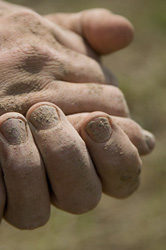Labor Day: It’s More Than Just a Day Off of Work
by www.SixWise.com
Most people are familiar with the concept of Labor Day. After all, it’s one of the few national holidays that nearly everyone gets off from work and school, and it’s the last long weekend of summer before the start of fall.

Labor Day is a holiday meant to honor and celebrate the American worker. |
But if you look back into the history of Labor Day, you’ll find that it’s much more than just a day off of work -- it’s a holiday meant to celebrate the labor movement and its achievements, and all the contributions that working people have made to the United States.
How Labor Day Came About
If you were a worker in the late 1800s, chances are high that you’d have worked 12-hour days, seven days a week in poor working conditions. It wouldn’t matter if you were a child, either, as children also worked long hours for little pay.
Unions sprung up around this time to help Americans secure a better quality of life, and on September 5, 1882 10,000 workers held the first Labor Day parade, marching from city hall to Union Square in New York City.
This was the first time workers had taken a day off to honor themselves and also bring attention to the issues they had with their employers. For 12 years, increasing numbers of states held Labor Day parades, although the workers continued to take the day off with no pay.
In 1894, History.com reports that a major protest took place that may very well have secured the holiday we now know as Labor Day. Workers from the Pullman Palace Car Company in Chicago protested wage cuts and firing of union representatives. Weeks later, the American Railroad Union began to boycott all Pullman railway cars in response and within days 50,000 rail workers succeeded in halting all traffic out of Chicago.
Major rioting broke loose at that time and although military troops eventually succeeded in collapsing the boycott, it brought worker’s rights issues into public awareness.
In 1894, Congress declared that the first Monday in September would be a holiday for workers known as Labor Day.
As for who actually proposed the idea of Labor Day remains uncertain. Some records show Peter J. McGuire, general secretary of the Brotherhood of Carpenters and Joiners and a cofounder of the American Federation of Labor, deserves the credit for suggested a day to honor those "who from rude nature have delved and carved all the grandeur we behold."
However, other experts believe Matthew Maguire, a machinist and secretary of the Central Labor Union in New York, proposed the holiday in 1882.

Although Labor Day was declared in 1894, it wasn’t until 1938 that Congress proposed the Fair Labor Standards Act, which established a minimum wage (then 0.25 an hour) and a maximum workweek (then 44 hours). |
Fun Ideas for Celebrating Labor Day
The original proposal for Labor Day included guidelines on how the holiday should be celebrated, with the main feature being a street parade to show the public “the strength and esprit de corps of the trade and labor organizations,” followed by a festival for the workers and their families.
Nowadays, Labor Day is more often a long weekend meant to enjoy the last remaining days of the summer. With that in mind, Labor Day is coming up on September 7 this year, and we suggest you make the most of it with these fun ideas:
-
Have a cookout with your friends and family
-
Visit a state park and hike or bike the trails
-
Create Labor Day decorations with your family (similar to Fourth of July decorations, Labor Day festivities often are marked with flags and other patriotic symbols)
-
Have your children create drawings or puppets of their favorite professions
-
Make the most of the last days of summer by setting up a sprinkler in your yard for the kids, taking a camping trip or playing volleyball, bocce, softball or other outdoor games
-
Relax! That is the point of Labor Day, after all!
Recommended Reading
What to Do if Laid Off? Eight Tips to Bounce Back and End Up Stronger
Five Things to Beware of This Barbecue Season
Sources
U.S. Department of Labor: The History of Labor Day
USA.gov Labor Day
History.com Labor Day History